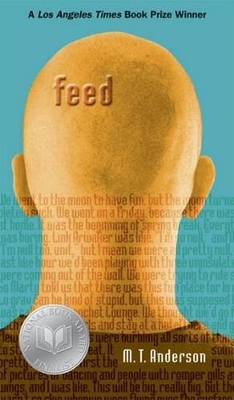Reviewed by Amber (The Literary Phoenix) on
1.) It's a dystopian novel. I have a weak spot for dystopian novels.
2.) The characters feel real to me. Not an adult trying to write a teenager. I never doubt Titus as a character, never second-guess his motives. Perfectly crafted.
3.) The language. This is a pitfall for many people, but for me, it just ropes me in closer to the story.
4.) The questions it asks about technology and our dependence on it. And on instant gratification.
I can see where this novel would be immediately flagged "Evil! STAY AWAY!" for some people, mostly for the reasons I have listed that I love it. In that, it must be understood that not all books appeal to all people. This book has, in my experience, always sparked controversy among its teen readers (see my incredibly biased entry, The Book Bias, for more on exactly how this book has been flagged by real teens), and is therefore a perfect choice for reading in high school. If nothing else, the students will want to discuss how much they hated it... which is the starting point for a wonderful discussion.
But I didn't hate this book. As I said, I loved it. I have read it multiple times, and my opinion of it hasn't changed. I love being able to walk away from a book and ask questions about it. I love being so wrapped up in a fictional universe that I'm watching the clock at work not just because I'm excited to get out of there, but because I want to immerse myself in the literary world again. Feed did that for me, and does that every time I read it.
Feed explores not only the dangers of a reliance on technology and instant gratification (those happen to be my favorite topics) but also criticizes the way we are destroying the ecosystem, taking education for granted, the sheep-like nature of the populace to follow the lead of celebrities, the declining rate of general health, overspending, substance use, negligent parenting, and on and on I could go. If there's a controversial topic you want to touch on, Feed probably has something to say about it. That, I would say, is probably Anderson's greatest fault in the book - he tried to say a little bit about a lot of things. It makes the book a little overwhelming, if you are reading it closely.
Then again, maybe that's the point.
(( Cross-posted on my blog: The Literary Phoenix.))
Reading updates
- Started reading
- 21 May, 2016: Finished reading
- 21 May, 2016: Reviewed
- Started reading
- Finished reading
- 21 May, 2016: Reviewed
- Started reading
- Finished reading
- 21 May, 2016: Reviewed
